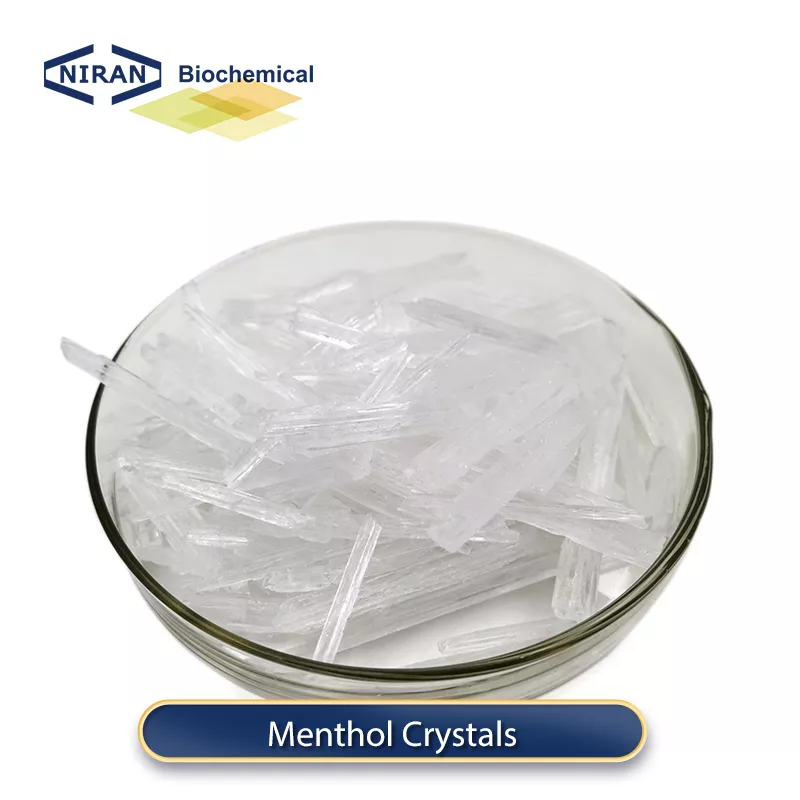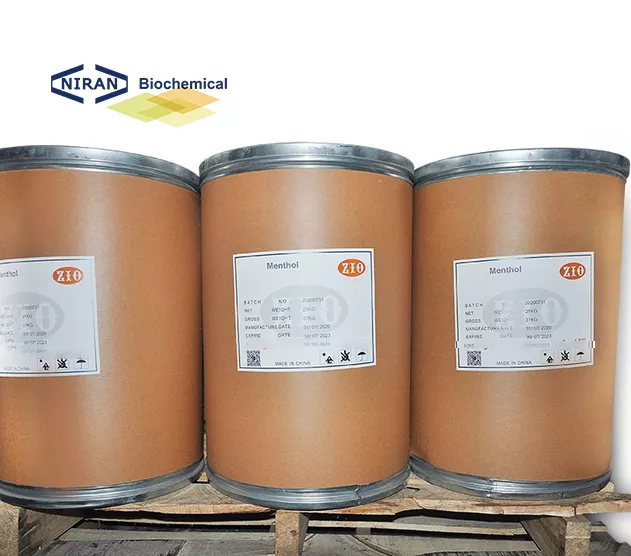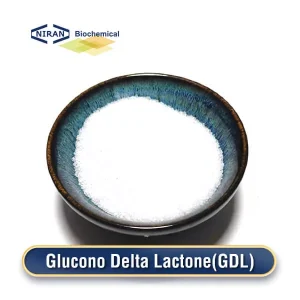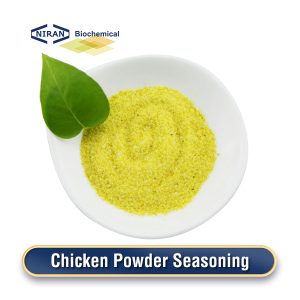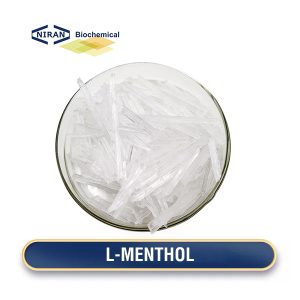Niran Biochemical
YOUR RELIABLE FOOD INGREDIENTS
Send Inquiry
Home » Products » Flavour Enhancer » Menthol Crystals
Menthol Crystals
- CAS: 2216-51-5
- Chemical Formula: C10H20O
- Certification: KOSHER, ISO, HALAL, FSSC22000, BRC, etc.
- Standard: FCC VI
- MOQ: 1000KG
- Shelf Life: 2 Years
Inquire Product
Product Description
What is Menthol Crystals?
Menthol crystals are an organic substance with a refreshing mint aroma. They appear as white or colorless block crystals. They are chemically stable and can evaporate with steam. They are suitable for usage as flavorings in culinary products like drinks and candies.
There are four preparation processes for Menthol crystals:
1. Extract peppermint oil by steam distillation. The extracted peppermint oil contains menthol. Then the peppermint oil is refined to remove other components to obtain high-purity menthol. However, this method has a high extraction rate and is more commonly used in China.
2. Cool the peppermint oil or add a solvent, and crystallize menthol by controlling the temperature and the choice of solvent. Menthol crystals are usually obtained by filtration or centrifugation. This technique yields a relatively pure substance, which finds widespread application in China.
3. Menthol is synthesized by chemical synthesis reaction using raw materials such as isoamyl acetate. This process can control the purity and quality of the product, but the process is complicated and the cost of raw materials and equipment is high.
4. Fermentation using specific microorganisms to produce menthol. Microorganisms synthesize menthol under specific conditions, and then obtain menthol crystals through extraction and purification steps. This process is relatively environmentally friendly, but requires a long fermentation cycle and control of microbial culture conditions.
Related parameters:
| ITEM | STANDARD |
| Odor | Peppermint |
| Melting Point (℃) | 41℃~44℃ |
| Solubility (25℃) | Very soluble in alcohol, volatile oils; slightly soluble in water. One ml dissolves in 1 ml of 95% ethanol. |
| Residue on evaporation | NMT 0.05% |
| Specific Rotation (25℃) | – 45°~ – 51° |
| As Content | ≤ 3 ppm |
| Heavy Metals | ≤ 10 ppm |
| Chromatographic purity | The peak response due to menthol is not less than 97% |
| Heavy Metals (as PB) | ≤ 10 mg/ kg |
Recommended dosage:
| Food name | Maximum usage(g/kg) |
| Mint chewing gum | 0.1-0.3 g/kg |
| Mint candy | 0.2-0.5 g/kg |
| Mint chocolate | 0.1-0.3 g/kg |
| Mint milkshake | 0.1-0.2 g/kg |
| Mint flavoring | 0.05-0.1 g/kg |
| Mint flavoring mixture | 0.2-0.5 g/kg |
| Mint flavoring | 0.1-0.2 g/kg |
| Mint juice drink | 0.05-0.1 g/kg |
| Mint frozen dessert | 0.1-0.2 g/kg |
Menthol crystals has a wide range of uses
1. Provide a refreshing mint flavor: Menthol crystals have a strong refreshing mint flavor, which can significantly enhance the mint flavor in foods and beverages, making them taste more refreshing and refreshing.
2. Improve the taste of food: The cooling effect of menthol can enhance the taste of food, making the product feel more refreshing and comfortable in the mouth.
3. Mask bad odors: The fragrance of menthol can effectively mask bad odors or other undesirable flavors in food, thereby improving the flavor of the product. This makes it an ideal choice for masking odors in condiments, ready-to-eat foods and certain processed foods.
4. Enhance the cooling sensation: Menthol has a significant cooling effect and can provide a natural cooling sensation similar to mint leaves in food. This property makes it widely used in chewing gum, ice cream and frozen desserts to enhance the cooling sensation.
5. As a flavor and flavoring agent: Menthol is used as a flavor and flavoring agent, and its strong mint flavor can effectively enhance and adjust the flavor of food.
6. Improve shelf life: Menthol possesses some antibacterial qualities that can assist prolong food storage and prevent the growth of specific microbes.
User asked question:
Q: What effects do menthol crystals have on the body?
A: 1. Cooling sensation: Menthol has a significant cooling sensation that can stimulate the temperature receptors in the mouth, providing a cool and comfortable experience. Moderate intake can enhance the flavor and taste of food.
2. Promoting digestion: Menthol may help promote digestion in moderate amounts and help relieve stomach discomfort. Its cooling sensation may also provide relief for some digestive problems.
3. Antibacterial effect: Because of its specific antibacterial qualities, menthol can help promote good oral hygiene by preventing the growth of bacteria in the mouth.

